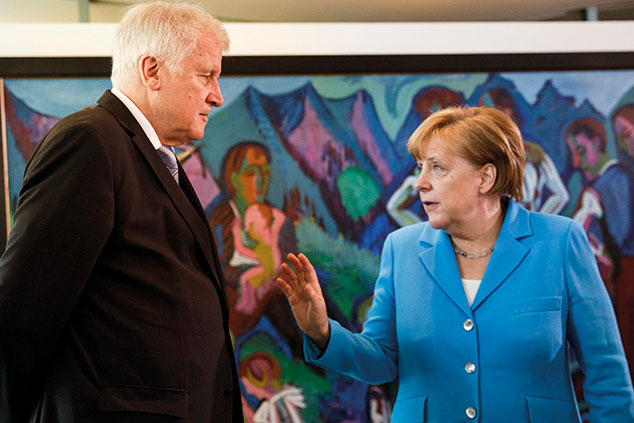
Germany’s deal on refugees looks like a fudge. Matthew Partridge reports.
European immigration policy is becoming “the modern equivalent of the Schleswig-Holstein question – a notoriously complicated 19th-century political conflict that only a few people understood”, says Wolfgang Münchau in the Financial Times. Immediately after agreeing a “hard-fought” deal over refugees with other European leaders, Germany’s Angela Merkel was struggling to settle a dispute with her own interior minister Horst Seehofer “that could have ended their no longer quite so grand coalition”.
Seehofer threatened to resign both as minister and as chair of the Christian Social Union (CSU), the sister party of Merkel’s Christian Democratic Union (CDU), unless Merkel agreed to turn back refugees who had applied for asylum in other countries at Germany’s border. After emergency negotiations, the duo agreed on Monday to a deal that will create refugee camps, known as transit centres, along the Austrian border for people who have already claimed asylum in another EU state. In theory, this will make it easier to send them back to the countries where they were registered.
A good compromise?
“Like any good compromise, [this] allows both sides to claim victory,” says Matthew Karnitschnig on Politico. The chancellor “can say she prevented a German go-it-alone approach that ignores the concerns of its neighbours”, while “the CSU can argue that it pressured Merkel into accepting harsher border policies than she would have liked”. Yet in practice, the plan “has more holes than a piece of Swiss cheese”, says The Economist.
First, the Social Democratic Party (SPD), which also forms part of Merkel’s coalition, is “firmly opposed” to the transit centres. Even if the SPD changes its mind, Austria says that if Germany starts rejecting migrants at the Austrian border, it will do the same on its borders with Italy and Slovenia. This would infuriate Italy, which has already refused “various financial inducements and offers of support” to take back refugees. “Something will have to give.”
Merkel’s future in doubt
Whatever happens, Merkel’s future is in question, says Alexander Neubacher in Der Spiegel. The row has “shattered” one of the “certainties” of German politics – namely that “when push came to shove, the CSU always seemed aware of what it needed to do both in the country’s interests and its own”. By turning on Merkel, Seehofer has turned the CDU/CSU alliance into a “piece of paper”, while also helping the opposition Alternative for Germany (AfD). “There’s no better gift the CDU and CSU could give the right-wing populists than to tear each other apart over refugee policy.”
What’s more, “countries to the north, south and east of Germany have already moved away from Merkel’s vision of a European refugee policy”, says Fredrik Erixon in The Spectator. Even liberal Nordic countries, broadly sympathetic to Merkel’s position on refugees, have concerns. From being “Queen of Europe”, Merkel is “now a beggar”. There is now a strong chance that “she won’t even make it through the summer”.
Mexico votes for radical change
“Mexicans were hungry for a change and right to be so,” says the Financial Times. Frustrated by “the mismanagement they have endured at the hands of the hitherto dominant political elite”, they handed a “resounding victory” to Andrés Manuel López Obrador (AMLO) in the presidential election last weekend, making him the “first anti-establishment politician from outside the mainstream to win the presidency in a century”.
They also gave his Morena party, founded just four years ago, “the largest majority in Congress – and possibly the Senate, too – since Mexico’s transition to democracy 20 years ago”. The question is what he will do from that base.
AMLO, who ran for president twice before, has promised a “radical revolution”, says The Economist. “Some hear that as a threat.” In the past he has opposed economic reforms. More worryingly, critics have compared him to Hugo Chávez, who “brought ruin to Venezuela”. Certainly “the nationalist populism he offers is unlike anything Mexico has seen since the early 1980s”.
Yet equating AMLO to Chávez is ridiculous, says Katherine Corcoran in The Washington Post. His policies when serving as mayor of Mexico City were far from radical. The real worry is that he won’t go far enough to rid the country of “the violence and corruption that is currently drowning its future” – for example, by fighting for “a professional, independent judicial system and a fairer distribution of wealth”. His predecessors all promised to tackle these problems. All failed. AMLO has offered “scant details” to show how he proposes to do better.